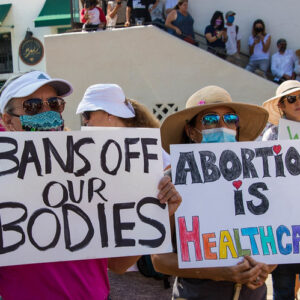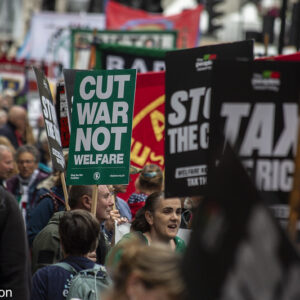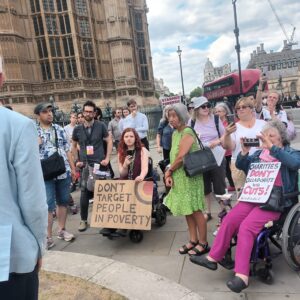Is the future hybrid?
On 27-29 May in Glasgow, UCU (University and College Union) holds its first in-person Annual Congress since the pandemic. As in many trade unions, UCU activists have been coming to terms with the world of online and hybrid meetings.
While being able to attend union meetings remotely facilitates participation by some members, particularly those with health conditions and disabilities which make travel difficult, online and hybrid meetings also raise issues of union democracy. UCU held its Congresses in 2020, 2021 and 2022 online. The online format potentially gives the Chair more opportunity to control the debate than at an in-person meeting, as delegates are all isolated at their computers. It also means delegates lack opportunities for informal discussion as happens at in-person events.
Congress motions include issues of access and democracy in how UCU conducts meetings. Trade unions must consider equality for disabled members, including those suffering from Long Covid. We also need to consider in union organizing approaches how to involve workers in casualised employment who may be working for employers in two or three cities and permanently resident in yet another location. Casualisation is a big issue for UCU. There are questions about how to use remote conferencing technologies in ways which are democratic and inclusive, and it is important unions get these issues right. For instance, what is the right balance of convenience and responsible democratic participation, e.g., listening to debate before voting, rather than too much multi-tasking at a computer.
Social media: friend or foe?
What role should social media play in union debates and decision-making. Social media can promote discussion and build for actions. It is better than the world before the internet when union bureaucrats tried to control all union communications in a top-down fashion and to prohibit lateral contact among branches. There are, however, problems that can arise. These include occasional rants and abuse on social media, how sensitive material about industrial strategy is reported, and the brief nature of communications on twitter which can remove nuance and careful consideration from debates.
In the current higher education dispute, there have been debates in UCU about the use of electronic consultations and e-ballots about the progress of the dispute. These have been used too frequently without sufficient time for branches to meet and discuss. There is also the problem with these exercises that the person who words the consultation can frame the debate in ways which favour or exclude some options. There is a need for greater democratic control of these exercises by nationally elected union committees.
Role of General Secretary
There will be debates around the GS’s management of the industrial disputes in higher education. Motions of censure and no confidence have been submitted. There will be debate about the admissibility of these motions. There is the democratic question of whether Congress has the right to debate these matters and then, if these matters are debated, what view delegates take. In 2018 there was considerable disruption to UCU Congress over similar questions. The left should support the right of union delegates to debate these matters.
Strategy for industrial disputes
On Sunday 28 May UCU Congress holds it Further Education and Higher Education Sector Conferences to decide industrial policy for the sectors.
For both sectors, as for workers generally, there is the challenge of how to formulate demands in the context of a cost-of-living crisis and escalating workloads. There is the question of what level of action is sufficient to bring the employers to the negotiating table with an acceptable offer.
In many recent disputes, under government pressure, there has been a refusal by employers to negotiate. Sometimes employers try to present simply talking to trade unions as a great concession, in return for which workers should abandon industrial action. Trade unions should not suspend action just in return for talks.
Higher Education
UCU’s Higher Education Sector Conference will discuss two major disputes: the struggle to defend the value of USS (University Superannuation Scheme) pensions and the ‘Four Fights’ dispute, which covers pay, pay equality, casualization and workloads. At present industrial action is continuing over the Four Fights dispute in the form of a marking and assessment boycott (MAB).
Much work at the grassroots has gone into winning industrial action ballots and organizing action short of a strike. UCU Left and the UCU Solidarity Movement have held regular online meetings. These meetings have linked workplace activists and talked through the practical steps involved in winning ballots and organizing the MAB.
Employers are responding to the MAB with threats to deduct pay. Some are threatening 100% deductions, some lesser amounts. UCU branches need to respond to these threats by escalating to strike action. UCU also needs to deliver financial support to members hit by punitive pay deductions.
Further Education
In FE UCU members are taking and preparing action over pay and workloads. Debates will be around how to achieve pay parity with school teachers and how UCU can build towards nationally aggregated action in FE.
International
In the international section of Congress business there is a motion from the NEC on international solidarity and cooperation, and the importance of learning from other unions internationally. There are two motions on Ukraine and three motions on Palestine. There may be a late motion on Sudan.
Ukraine
The ‘Stop the War in Ukraine – peace now’ motion condemns Russia’s invasion of Ukraine and states that Putin has unleashed war crimes. It calls on the UK to stop arming Ukraine, leaving the Ukrainian people defenceless against invasion and war crimes. It is based on the 1914 scenario which treats the war as solely a proxy war between imperialist powers. This perspective omits self-determination for Ukraine and denies the Ukrainian people any agency in the process. There may be amendments submitted, which remove the worst aspects of the motion, but it would be better if it is defeated regardless of the outcome of the vote on the motions.
The NEC motion ‘Solidarity with Ukraine: supporting education and humanitarian work’ comes from a solidarity perspective. It includes recognition of Ukraine’s right to self-determination, a call for cancellation of Ukraine’s national debt and tasks UCU’s International Working Group to undertake solidarity work, including online meetings with Ukrainian trade unionists and support for Russian anti-war activists. If carried, this motion will provide a basis for developing solidarity work to support Ukrainian workers and trade unions.
Palestine
There are three motions on Palestine, commemorating the 75th Anniversary of the Nakba, supporting BDS (Boycott, Disinvestment and Sanctions), condemning the UK government’s introduction of an anti-BDs bill, and condemning recent Israeli Government attacks on the Palestinian people, such as the designation of Palestinian human rights organisations as ‘terrorist’.
Equality and the rise of the far right
Motions on equality cover gender, disability rights, British Sign Language, LGBT+ rights and gender recognition and support for refugees. An NEC motion addresses the need to oppose the far right, recognizing how the Government’s anti-migrant rhetoric has encouraged attacks on hotels housing refugees. It also condemns the way anti-woke statements by Government ministers have targeted LGBT+ communities.
Conference Solidarity Meeting
Ukraine Solidarity Campaign UCU Congress Online Fringe Meeting
THURSDAY 11 MAY 2023 19.00-20.30
Trade union conferences are debating what attitude unions should take on the war in Ukraine and what solidarity we can offer to our fellow workers in Ukraine and to Russian war resisters. The Scottish TUC recently adopted a robust policy to stand in solidarity with Ukraine. See: STUC Stands inSolidarity with Ukraine
What are the issues?
What are the views of Ukrainian academics and trade unionists?
Please come to our meeting and hear their views.
UCU’s NEC is bringing a motion to UCU Congress (27-29 May in Glasgow) which maps out some solidarity measures which UCU can undertake as a union. Some individual UCU members are already involved in Ukraine solidarity work through community and voluntary organizations.
We hope that the NEC motion will be a useful basis for building solidarity with academic and related staff in Ukraine, their trade unions and the wider Ukrainian trade union movement.
All UCU members, including Congress delegates, are welcome to an online pre-Congress fringe meeting hosted by the Ukraine Solidarity Campaign.
Please pass this invitation to any UCU members who may be interested in attending.
STAND WITH UKRAINE
Speakers:
JOHN MCDONNELL, Labour MP for Hayes and Harlington
VOLODYMYR FUNDOVNYI Chair of the Free Trade Union of Education and Science of Ukraine
DENYS PILASH, Political scientist, Taras Shevchenko National University of Kyiv and member of Sotsialny Rukh (Social Movement) (Ukrainian Democratic Socialist organization)
THURSDAY 11 MAY 2023 19.00-20.30
Chairs: Vicky Blake, Immediate Past President and University of Leeds, Liz Lawrence, UCU President 2014-16 and Yorkshire and Humberside Retired Members’ Branch
Please click the link below to join the webinar:
https://us06web.zoom.us/j/87233945971?pwd=VWJLRjRjRUs3Zk9rMDJzYU01bWdwdz09
Passcode: 646771
Art (53) Book Review (121) Books (114) Campism (31) Capitalism (68) China (80) Climate Emergency (98) Conservative Government (90) Conservative Party (45) COVID-19 (44) Creeping Fascism (35) Economics (40) EcoSocialism (55) Elections (83) Europe (46) Far-Right (34) Fascism (57) Film (49) Film Review (68) Fourth International (31) France (70) Gaza (60) History (38) Imperialism (100) Iran (31) Israel (124) Italy (46) Keir Starmer (53) Labour Party (111) Long Read (42) Marxism (49) Marxist Theory (48) Migrants (34) Palestine (169) pandemic (78) Police (31) Protest (152) Russia (340) Solidarity (142) Statement (48) Trade Unionism (141) Trans*Mission (31) Ukraine (346) United States of America (132) War (368)
Latest articles
- Abortion and the Fight for DecriminalisationReproductive rights are on the line in Europe and the States, with the principle of bodily autonomy at stake. Paris Wilder and Liz Lawrence give the historical context of UK abortion law whilst exploring the implications for achieving full decriminalisation.
- Starmer’s first year – things can only get worseThe centre cannot hold… Dave Kellaway assesses Starmer’s first catastrophic year as Prime Minister.
- A new left party emerges?A new left party is on the cards, but it is unclear what is going on behind the scenes. Simon Hannah looks at the bigger issues a new party needs to address.
- Time moves onA poem by Liz Thompson
- You cut, we bleedjoseph healy reports from Old Palace Yard as campaigners protested the Universal Credit Bill which will devastate the lives of many disabled people.






